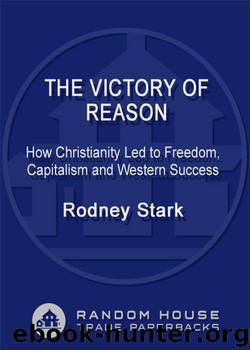The Victory of Reason by Rodney Stark

Author:Rodney Stark
Language: eng
Format: mobi, epub
Tags: Nonfiction
ISBN: 9781588365002
Publisher: Random House Publishing Group
Published: 2007-12-17T21:00:00+00:00
CAPITALISM COMES TO NORTHERN FLANDERS
Following the French annexation of the Walloon districts in the south, northern Flanders became the center of the European woolen industry, which was particularly concentrated in the cities of Bruges, Ghent, and Antwerp. Importing fleeces from England and trade goods from Italy in exchange for woolen cloth made Flanders a financial as well as a manufacturing giant. Having managed to overcome the most repressive effects of the local guilds, firms began to grow and to manifest the primary features of capitalism. However, this capitalism was not native to Flanders. It was imported by entrepreneurs who supplanted the merchants and weavers’ guild with well-managed firms that integrated the entire woolen industry: importing the fleeces, coordinating all of the steps and hiring all of the subcontractors necessary to turn wool into cloth, and then exporting it based on market conditions. An early “market-driven” innovation was that, in addition to its more expensive, luxury woolens, Flanders soon began to produce less expensive varieties that led to an immense increase in sales.
These “Flemish” entrepreneurs were Italians, and their firms were Italian branch banks. Recall that, having not been content to continue buying cloth at the cycle of northern fairs, Italian banks had set up permanent branches in leading woolen centers in order to buy directly on a regular basis. Having done so, the bankers quickly recognized the inefficiencies of the guild system and saw that they could greatly increase their profits and better coordinate production to demand by managing the industry directly. In addition to organizing the woolen industry and selling the cloths abroad, the Italian banks imported and sold all manner of trade goods from elsewhere. Of course, they also lent money and dealt in bills of exchange. Soon, “only the trade and the credit of the Italian merchants kept the looms humming.” 8
Bruges
But if Italians kept the looms humming in Flanders, it is equally accurate to say that the looms of Flanders were so vital to Italian banking that no firm without a Bruges branch ever amounted to much. All three of the “supercompanies” did nearly as much business in Bruges as at home, and the same was true for the Medici Bank a century later. In fact, of all its branches, the Medici Bank in Bruges had the largest capitalization—higher even than that of the home bank in Florence. 9
But why manufacture woolens? Because the poor soil of Flanders was far more suitable for grazing sheep than for raising crops. Moreover, Flanders’s sheep produced good quality fleeces, and since the sheep ranches were spread out, the early cloth industry was widely dispersed in rather small villages. In time, however, Flanders’s weavers became increasingly dependent upon English fleeces, which were markedly superior even to their own. Consequently, the woolen industry was concentrated in larger communities that had firms with sufficient capital to support foreign trade. Chief among these cities was Bruges, especially with the arrival of Italian bankers.
Not that Bruges ever became a manufacturing town. It lived instead from trade and transportation.
Download
This site does not store any files on its server. We only index and link to content provided by other sites. Please contact the content providers to delete copyright contents if any and email us, we'll remove relevant links or contents immediately.
Joan of Arc by Mary Gordon(4115)
Victory over the Darkness by Neil T. Anderson(2869)
The Gnostic Gospels by Pagels Elaine(2532)
Devil, The by Almond Philip C(2333)
The Nativity by Geza Vermes(2233)
The Psychedelic Gospels: The Secret History of Hallucinogens in Christianity by Jerry B. Brown(2158)
Going Clear: Scientology, Hollywood, and the Prison of Belief by Lawrence Wright(1985)
Going Clear by Lawrence Wright(1968)
A TIME TO KEEP SILENCE by Patrick Leigh Fermor(1914)
Barking to the Choir by Gregory Boyle(1822)
Old Testament History by John H. Sailhamer(1818)
Augustine: Conversions to Confessions by Robin Lane Fox(1774)
A History of the Franks by Gregory of Tours(1729)
A Prophet with Honor by William C. Martin(1728)
The Bible Doesn't Say That by Dr. Joel M. Hoffman(1682)
The Knights Templar by Sean Martin(1655)
by Christianity & Islam(1636)
The Source by James A. Michener(1616)
The Amish by Steven M. Nolt(1575)
